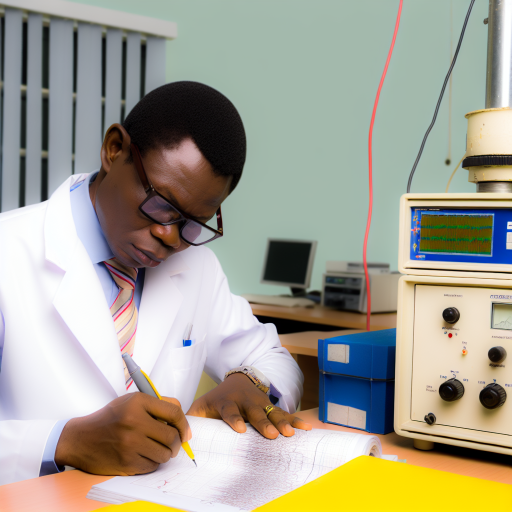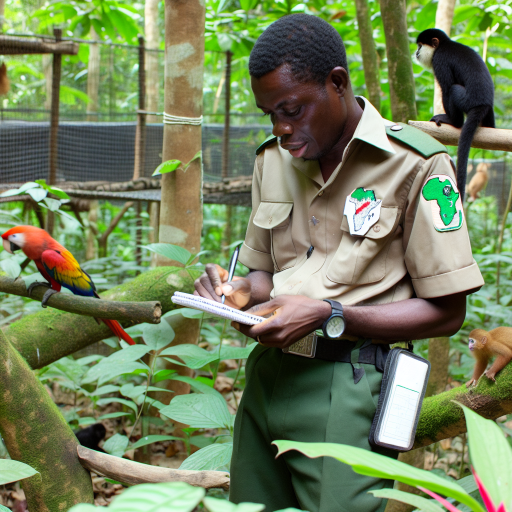Introduction:
Environmental microbiology in Nigeria focuses on the study of microorganisms in various ecosystems within the country.
This field plays a crucial role in understanding the impact of microorganisms on the environment.
Studying environmental microbiology in Nigeria is important for several reasons.
Firstly, it helps in assessing the quality of soil, water, and air, which are essential for human health and ecosystem sustainability.
Secondly, it provides insights into microbial roles in biogeochemical cycles, pollutant degradation, and ecosystem dynamics.
Despite the importance of environmental microbiology, Nigeria faces several challenges in this field.
Limited research funding, inadequate infrastructure, and low awareness of the significance of microbial studies hinder progress.
However, there are opportunities for growth, such as collaborations with international research institutions, capacity building initiatives, and increased public engagement.
Advances in microbial diversity:
– Exploration of various microbial communities in different environmental niches.
– Identification of novel microorganisms with unique capabilities.
– Impact of microbial diversity on ecosystem functioning.
Microbial diversity in Nigeria has been a subject of growing interest and research in recent years.
Scientists and researchers have been actively exploring various microbial communities present in different environmental niches across the country.
These efforts have led to the discovery of novel microorganisms with unique capabilities.
These microorganisms have the potential to revolutionize various fields, from biotechnology to environmental conservation.
One of the key areas where advances in microbial diversity have had a significant impact is in understanding the role of microorganisms in ecosystem functioning.
Microbes play a crucial role in nutrient cycling, decomposition, and soil health, among other vital ecosystem processes.
By studying the diversity of microbes in different ecosystems, researchers can gain a deeper understanding of how these tiny organisms contribute to the overall functioning and resilience of the environment.
Exploration of various microbial communities:
One of the key advances in environmental microbiology in Nigeria is the exploration of various microbial communities in different environmental niches.
Researchers have been conducting field studies, collecting samples from diverse ecosystems such as soil, water bodies, and plant tissues.
These efforts have revealed a rich diversity of microbial species, many of which were previously unknown or understudied.
Identification of novel microorganisms:
Through advanced molecular techniques and bioinformatics tools, scientists in Nigeria have successfully identified novel microorganisms with unique capabilities.
These newly discovered microbes possess biochemical pathways and traits that make them valuable for various applications.
Applications include bioremediation, drug discovery, and agriculture.
By characterizing these novel microorganisms, researchers are unlocking new possibilities for sustainable development and environmental management.
Impact of microbial diversity on ecosystem functioning:
The diverse array of microorganisms present in Nigerian ecosystems plays a crucial role in ecosystem functioning.
Microbes are involved in essential processes such as nutrient cycling, decomposition of organic matter, and maintaining soil fertility.
By studying how microbial diversity influences these ecosystem functions, researchers can develop strategies for conserving biodiversity and promoting environmental sustainability.
Technological advancements in environmental microbiology:
- Introduction of high-throughput sequencing techniques for microbial analysis
- Application of bioinformatics tools for data interpretation
- Development of advanced cultivation techniques for previously unculturable microorganisms
Environmental microbiology is a rapidly evolving field.
It is driven by technological advancements that have revolutionized our understanding of microbial communities in different ecosystems.
In Nigeria, there have been notable progress and innovations in environmental microbiology.
This is particularly evident in the areas of high-throughput sequencing, bioinformatics, and cultivation techniques.
High-throughput sequencing techniques:
One of the significant advancements in environmental microbiology is the introduction of high-throughput sequencing techniques.
These include 16S rRNA gene sequencing and metagenomics.
These techniques allow researchers to analyze microbial communities in various environmental samples.
Such analysis is achieved with high accuracy and resolution.
In Nigeria, researchers have adopted these sequencing technologies.
They study the diversity and composition of microbial populations in soil, water, and air samples.
Application of bioinformatics tools:
With the increasing amount of data generated from high-throughput sequencing, the use of bioinformatics tools has become essential.
These tools are crucial for data interpretation and analysis.
Transform Your Career with Expert Guidance
Get personalized mentorship consulting that’s tailored to your unique path. Our expert advice is actionable and exclusive.
Get StartedIn Nigeria, researchers are utilizing various bioinformatics software and databases.
They identify and characterize microbial taxa and predict the functional capabilities of microbial communities.
Furthermore, they assess the impact of environmental factors on microbial diversity.
Development of advanced cultivation techniques:
Traditionally, many microorganisms in the environment are considered unculturable using standard laboratory techniques.
However, recent developments in cultivation methods are changing this perspective.
Techniques such as enrichment cultures, co-culturing, and single-cell isolation have enabled the isolation and cultivation of previously unculturable microorganisms.
In Nigeria, scientists are experimenting with these advanced cultivation techniques.
They aim to discover novel microorganisms with unique metabolic properties and potential biotechnological applications.
Learn More: Economic Impact of Boat Building in Nigeria
Environmental applications of microbiology:
- Bioremediation of polluted environments using microbial consortia
- Sustainable agriculture practices utilizing microbial inoculants
- Biocontrol of plant pathogens through microbial agents
Microbiology plays a crucial role in addressing environmental challenges in Nigeria.
One of the key applications of environmental microbiology is the bioremediation of polluted environments using microbial consortia.
Bioremediation is a process that harnesses the metabolic capabilities of microorganisms to degrade or immobilize contaminants in the environment.
In Nigeria, microbial consortia have been successfully used to clean up oil spills in the Niger Delta region.
Microorganisms can break down various organic pollutants, including hydrocarbons, heavy metals, and pesticides, through biodegradation.
This process not only reduces the environmental impact of pollutants but also helps in restoring the ecosystem to its natural state.
Another important application of environmental microbiology in Nigeria is sustainable agriculture practices utilizing microbial inoculants.
Microbes such as Rhizobium, Azotobacter, and Mycorrhizae play a significant role in enhancing soil fertility and improving crop yield.
By inoculating agricultural soils with beneficial microbes, farmers can reduce the need for chemical fertilizers and pesticides, thereby promoting sustainable farming practices.
This not only benefits the environment by reducing chemical runoff but also improves the nutritional quality of crops.
Furthermore, microbial agents are also used for biocontrol of plant pathogens in Nigeria.
Certain microorganisms have the ability to suppress the growth of pathogenic fungi and bacteria, protecting crops from diseases without the use of harmful chemicals.
Biocontrol agents like Trichoderma, Bacillus, and Pseudomonas are commonly used in agriculture to manage plant diseases effectively.
This approach not only safeguards crop yield but also minimizes the environmental impact of synthetic pesticides.
The advances in environmental microbiology in Nigeria have paved the way for sustainable solutions to environmental and agricultural challenges.
By harnessing the power of microorganisms, Nigeria can work towards a cleaner environment and a healthier agricultural sector.
Explore Further: Applied Math and Data Science: Connections
Importance of Environmental Microbiology in Public Health
Environmental microbiology plays a crucial role in public health.
It contributes by monitoring and surveillance of microbial contaminants in water and food sources.
Identification of emerging pathogens and antibiotic resistance genes in environmental samples is essential.
Furthermore, it implements microbial risk assessment strategies for disease prevention.
Microbial contaminants in water and food can pose serious health risks.
Therefore, monitoring and surveillance are essential to prevent outbreaks of waterborne and foodborne illnesses.
Environmental microbiologists conduct regular assessments of water quality and food safety.
The goal is to ensure public health protection.
Moreover, the identification of emerging pathogens and antibiotic resistance genes is vital.
This identification is crucial for effectively controlling infectious diseases.
Advanced techniques in environmental microbiology allow researchers to detect new or evolving pathogens.
Such pathogens may pose a threat to human health.
Furthermore, identifying antibiotic resistance genes can aid in developing effective treatment strategies.
This helps prevent antibiotic-resistant infections.
The implementation of microbial risk assessment strategies is essential for disease prevention and control.
Environmental microbiologists utilize risk assessment tools to evaluate potential hazards.
By understanding the risks posed by various pathogens, scientists can recommend appropriate interventions.
This minimizes the spread of infectious diseases and protects public health.
Environmental microbiology plays a critical role in safeguarding public health.
By monitoring and surveillance of microbial contaminants, it identifies emerging pathogens and antibiotic resistance genes.
It also implements microbial risk assessment strategies.
Innovative research methodologies and technology are employed by environmental microbiologists in Nigeria.
These efforts are making significant advancements in enhancing disease prevention and control.
Explore Further: Innovative Teaching Methods in Applied Mathematics

Collaborative research initiatives in environmental microbiology:
- Partnerships between academic institutions, government agencies, and private industries
- Funding opportunities for research projects in the field
- Establishment of national databases for microbial research data sharing
Collaboration is key in advancing environmental microbiology in Nigeria.
Academic institutions, government agencies, and private industries are coming together to pool their resources and expertise to tackle complex environmental challenges.
These partnerships allow for a multidisciplinary approach to research, drawing on the strengths of each sector.
Partnerships between Academic Institutions, Government Agencies, and Private Industries
Academic institutions play a crucial role in conducting research and training the next generation of scientists.
By partnering with government agencies, researchers can ensure that their work has real-world applications and can influence policy decisions.
Private industries bring in funding, infrastructure, and industry-specific knowledge that can help translate research findings into practical solutions.
Funding Opportunities for Research Projects in the Field
Securing funding for research projects is essential for making progress in environmental microbiology.
In Nigeria, there are various funding opportunities available from government agencies, international organizations, and private foundations.
These funds support both basic research and applied projects that aim to address specific environmental problems.
Establishment of National Databases for Microbial Research Data Sharing
One of the challenges in environmental microbiology research is the lack of centralized data repositories for sharing research findings.
To address this issue, national databases are being established to collect and disseminate microbial research data.
This not only promotes transparency and collaboration within the research community but also allows for the integration of diverse datasets for more robust analysis.
You Might Also Like: Applied Chemistry vs Pure Chemistry: Key Differences
Environmental Microbiology Advances in Nigeria
Several key advances have been made in environmental microbiology in Nigeria.
Researchers have successfully identified novel microbial species in various ecosystems.
This work sheds light on their roles in nutrient cycling and biogeochemical processes.
Future directions in this field include focusing on the application of microbial biotechnology for waste treatment and pollution remediation.
Such advancements will benefit the environment and the economy simultaneously.
These efforts will provide sustainable solutions to environmental challenges.
There is a call to action for increased investment and support for environmental microbiology studies in Nigeria.
With proper funding and resources, researchers can further explore vast microbial diversity.
By doing so, they will harness its potential for environmental sustainability.
Additional Resources
Harnessing the potentials of predictive microbiology in microbial …




